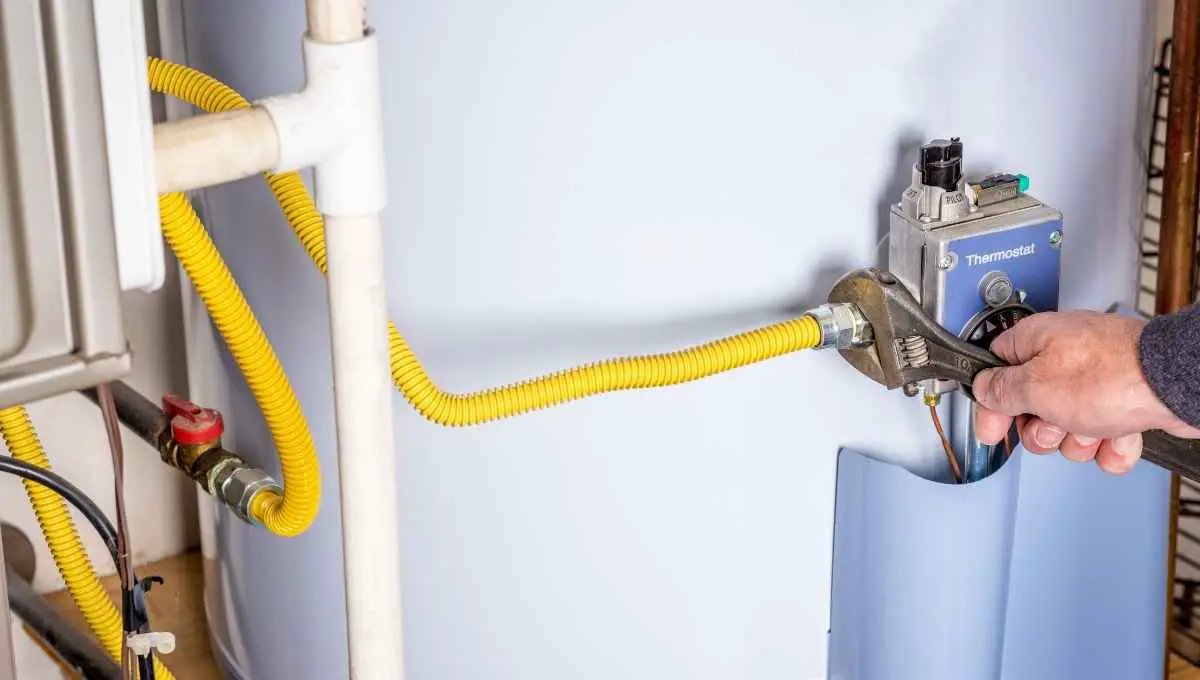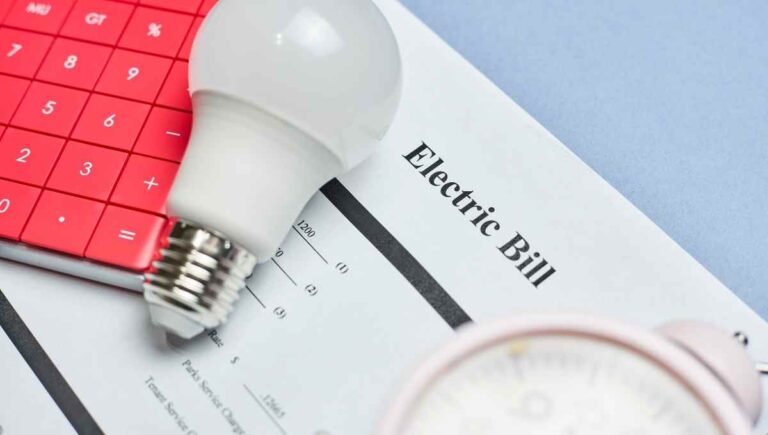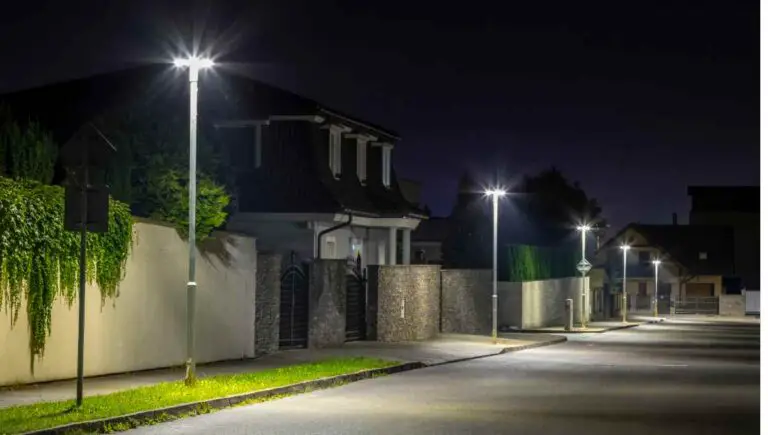Do I Need a Permit to Run a Gas Line? (Everything You Need)

Gas appliances, including gas range stoves, are a great addition to your home thanks to their energy-efficient properties. However, installing a gas line can be confusing and you are likely wondering if you need a permit to run a gas line.
Most cities require you to have a permit to run a gas line. This permit ensures that your house is properly equipped to manage a gas line so any gas-related accidents can be prevented.
Thankfully, we have done the research to let you know if you need a permit to run a gas line into your home and how you can go about obtaining one to avoid any legal issues.
This post contains affiliate links from Amazon and other stores. This means Yard Blogger may earn a commission if you make a purchase using any of our links. Please refer to our full affiliate disclosure policy for full details.
Here’s a Quick Pro Tip!
Although a permit and a professional are needed to install a gas line, you are sometimes allowed to extend a gas line yourself once it is already installed.
Here are some of our favorite tools from Amazon to make the job easier:
1. LASCO Gas Appliance Supply Line – The flexible designs allows for multiple bends around corners
2. Harvey Gas Line Seal Tape – Sealing tape specifically made for gas lines
Do You Need a Permit to Install Gas Appliances?
Whether or not you need a permit to install gas appliances depends on where you live but, in most places, it is required. Installing gas appliances can be dangerous if you do it yourself and don’t know what you’re doing.
If you choose to not obtain a permit before you install your gas appliance, you can run into a lot of issues down the road. Specifically, when you try to sell your home in the future, an inspector will surely question you on why you don’t have a permit which could dampen your selling process and possibly get you fined.
How Do I Get a Permit for a Gas Line?
To get a permit for a gas line, you typically have to apply online through your city’s website. You will have to provide building permits that include gas plans. You may be required to obtain an electrical permit, as well.
You will also have to identify the type of building you are getting the gas permit for, either residential or commercial. Depending on your city, the application will be reviewed typically within 2-3 business days.
This is the gas permit application form for Arlington, Va to give you an idea of what to look for. Usually, a gas and plumbing permit is the same form.
How Do I Apply for a Gas Permit?
To apply for a gas permit, you should visit your city’s website where the application form will be. You will need to have your building permit on hand and you may be required to upload a permit authorization affidavit.
You will likely be asked to create an account through the website which will lead you to the application form. From there, you can upload all requirements and then submit your application. They are typically reviewed within two to three days.
What Do I Need to Install a Gas Line?
To install a gas line, you first need to obtain a gas line permit. You can do this through your city’s website. They will have an application form for you to fill out and once submitted, you may receive the permit within three business days.
Apart from the permit, you also need to hire a professional plumber to install your gas line. In some areas, this is not needed but it is in most.
A professional is trained to safely install your gas line to avoid gas leaks from occurring which can be very harmful to your health.
Do I Need a Permit to Install a Gas Stove?
Most places require a permit to install a gas stove since gas lines are a major safety risk when they are not installed properly. Usually, a gas fitter or plumber will install your gas stove once you obtain a permit.
You can apply for a gas permit through your city’s website. The process is not long and it is mandatory.
If you fail to obtain a permit and install a gas stove yourself, you can put you and your family’s safety at risk and also open yourself up to legal issues.
You might also enjoy our post on Do You Need a Permit to Build a Treehouse?
Do I Need a Permit to Install a Gas Fireplace?
A permit is required to install a gas fireplace in most places. Dealing with a gas line requires special knowledge and skills fostered by plumbers and gas fitters. They will require a permit before they do any work on your gas fireplace.
A permit is necessary to ensure that your home is suitable for a gas line. Gas lines that are improperly installed can cause a major safety risk to you and your family.
To apply for a gas permit, visit your city’s website and fill out an application form.
Permit for Running Gas Line
A permit is needed to run a gas line since gas lines are a high safety risk when handled improperly. A professional needs to assess your home to ensure that it is capable of receiving a gas line.
You can apply for a gas permit by visiting your city’s website and filling out an application to have a gas line run to your house.
Once your application is submitted, a professional will visit your house to inspect everything to make sure your home can handle a gas line.
What Are the Types of Gas Lines and Permits?
The different types of gas lines are black iron yard lines, polyethylene yard lines, and CSST gas systems. The year your house was built will usually determine what type of gas lines you have since they have advanced throughout the years.
Regardless of your gas line, you will always need a gas permit and possibly an electrical permit depending on the job. Your city’s website will have an application form for you to fill out in order to get the gas permit and additional permits.
Do I Need a Professional to Install a Gas Line?
You will need a plumber to install your gas line. Specialized plumbers exist who are trained to install and repair gas lines since it is illegal to do it yourself. Doing it yourself is not only illegal but also very dangerous.
If you are thinking of installing a gas line yourself, you should think again. Installing a gas line yourself can result in unnecessary gas leaks which can be extremely detrimental leading to a full-on house fire or death from carbon monoxide poisoning.
You might also enjoy our post on Can You Have an Electric Fence Around Your Property?
Does Extending a Gas Line Require a Permit?
While technically extending a gas line doesn’t require a permit, once you already have the official gas line permit, you shouldn’t try to attempt this on your own since it’s a difficult task and can be dangerous if improperly extended.
You should hire a professional to extend your gas line to avoid any issues from occurring in the future. An improper extension of a gas line can lead to dangerous gas leaks that can result in an explosion or carbon monoxide poisoning.
How Much Does a Gas Line Permit Cost?
A gas line permit cost is roughly $100, depending on where you live. This typically involves one inspection per permit. If you need additional inspections for whatever reason, you may have to pay for the permit again.
To find out the cost of a gas line permit, you can visit your city’s website where they should have the information for you. This is the permit fee schedule for Florida to give you an idea of what to look for.
Who Can Install a Natural Gas Line?
A specialized plumber is typically the professional who installs a natural gas line. They are trained specifically to repair and install gas lines to ensure your gas line meets safety standards to protect you and your family.
If you are unsure if your plumber has the qualifications to install a gas line, you can ask them for their license and insurance numbers. Additionally, you should get at least three quotes before you decide on a plumber.
Do Plumbers Install Gas Lines?
Plumbers are capable of installing gas lines thanks to a certain specialized training program that allows them to install and repair gas lines. If you need a gas line installed, a local plumber will be your best bet to ensure safety and quality.
However, before you decide on a plumber, you should get quotes from at least three different companies. Once you have decided on one, make sure you have their license and insurance numbers to ensure they are properly trained.
Can a Homeowner Install a Gas Line?
You are not legally allowed to install a gas line in most areas. This is because if a gas line is installed improperly, the consequences can be detrimental possibly resulting in an explosion or carbon monoxide poisoning.
You should always hire a professional to install your gas line, even if you think you have the skills to do it yourself. Not only will you create a safety hazard, but you will also be breaking the law which could get you into trouble down the line.
Can I Run My Own Gas Line?
Running your own gas line is illegal in most areas. This is to ensure the safety of yourself and others. A gas line that is improperly installed can result in gas leaks which can be extremely dangerous.
If you need to run a gas line to your house, you should contact a trained professional. But, first, you will have to obtain a permit. The application process ensures that your house is properly equipped to use a gas line.
You might also enjoy our post on What To Do if Your House Smells Like Gas
Can I Install a Gas Range Myself?
You are not legally allowed to install a gas range yourself if you don’t already have a gas line permit, depending on where you live. But, in most places, this is the law. If you have a gas permit and want to put it in a range, you should still hire a professional.
Installing a gas range is very difficult and requires a lot of skills. If you don’t do it properly you could seriously injure yourself and your family. It is recommended to hire a professional.
Make sure you have your gas permit on hand when they come to install your gas range.
Can I Run My Own Gas Line to My Garage?
If you have a gas line already installed for your home, you are technically allowed to run your gas line to your garage. However, dealing with gas is a very sensitive skill and you should consider hiring a professional.
If you don’t know how to work with a gas line, this is not the time to watch a quick DIY video telling you how to. Dealing with a gas line is very tricky and if you mess up you could create some serious negative impacts on your safety.
How Deep Do You Bury a Gas Line?
A gas line should be buried 24 inches deep under driveways and parking areas, and 15 to 18 inches deep under nontraffic areas. You should check with your city’s bylaws before installing a gas line as it may differ in your area.
Before you start digging your gas line trench, you need to obtain a gas line permit. This is as easy as going to your city’s website and filling out an application.
The application only two around 3 days to process and then an inspector will come to your home to ensure everything you said was true.
What Size Is a Residential Gas Line?
A residential gas line is typically ¾ inch as this is the standard size that supports most home appliances. Some homes can have a combination of 1-inch, ½ inch, and ¾ inch gas lines.
When you apply for your gas line permit, the inspector who comes will be able to tell you what size your gas line should be. Once you have that information, you can begin purchasing your gas appliances that will work with that size of the gas line.
You might also enjoy our post on Can You Burn Down a Brick House?
Can I Get Charged for Not Having a Gas Line Permit?
If any work is done on your home without having a gas line permit, you could face legal implications. You will likely be charged with a “work without a permit” violation that can leave you fined.
This document from the city of New York states that there is a fine for working without a permit and the fine will be less if you had some permits but not all that you needed.
However, it is easy to obtain a permit after you get charged and you should as soon as possible.
Punishment for Not Having a Gas Permit
The punishment for not having a gas permit depends on where you live but you will most likely get fined. If you worked on our house without any permits, including building and electrical permits, your fine will increase.
The city of New York states that you will get fined fourteen times the amount of the fee for the original permit. So, if your gas line permit would have cost $100 then you will get fined $1400.
Related Questions
Can a Gas Pipe Be Run Externally?
Gas piping can be run externally if you use the correct type of piping. CSST (corrugated stainless steel tubing) is the most popular type of gas piping and is perfectly acceptable to use outside.
The piping is designed to withstand all sorts of weather conditions without affecting the quality of the pipe. The only incident that might affect the piping is a lighting strike, which is very rare anyways.
Who Is Responsible For External Gas Pipes?
For gas lines that run to a gas meter, they must be maintained by gas companies in the United States. For gas lines that run beyond the gas meter to the house, the homeowner or property owner is responsible for the gas pipes.
If you have a gas pipe that is running externally from your home to the gas meter, you are responsible for maintaining the pipe, ensuring it is in good condition and tightly sealed.
You are also required to schedule an inspection every four years to ensure quality.
Final Thoughts
As of now, you should have a strong idea of why you need a permit to run a gas line and how to obtain it.
Additionally, even though you may not need a permit to extend your gas line, you should still consider hiring a professional to help you in order to avoid any gas leaks.
Gas leaks can result in detrimental damage to your home and to your health. It is best to put your trust in the hands of a professional to protect you and your family whenever you are dealing with gas and gas piping.






